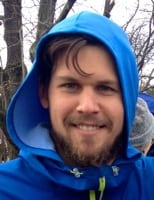Jo Meek is nicknamed “The Running Squirrel” but I’d say she’s more like a cat because she seems to have lived nine lives. She’s loved chocolate but since disavowed it, raced dinghies, worked at a shoe store, attended university twice, served in the British Army, competed in triathlon, and become a physical therapist.
Her running career has had many lives, too. She began running to lose weight, eventually took to cross country, evolved into a 2:46 road marathoner, and then turned to road ultras. After running an ambitious 13 ultramarathons in 2014, culminating in a fourth-place finish at the IAU 100k World Championships, she changed course this year and burst onto the trail scene by finishing 11th at the Transvulcania Ultramarathon, second at CCC, and seventh at the IAU Trail World Championships.
Without further ado, listen to this audio preview and then read on to learn more about one of Great Britain’s finest ultrarunners.
iRunFar: You’re called “The Running Squirrel.” We’ve talked about this off the record but it needs to be on the record.
Jo Meek: That came from the Marathon des Sables (MdS). Jon and I—we used to do this run through the woodland and there are a ton of squirrels—unfortunately they’re all gray over here—and we used to take our dog when he was young. Whenever he chased a squirrel, we sprinted as well—used it for fartlek training. Then when we stopped taking him, we said, “We’ll still do ‘squirrels,'” so we’d shout, “Squirrel!” and sprint. Eventually we made it that that would be a session [laughs]. But instead of saying “Go!” we’d say “Squirrel!” and just peg it and then we did that for the whole sort of 12 weeks. Once a week we’d go to this woodland and get a good run out of it—really hard, we’d work the hills, we’d shout “Squirrel!” at the bottom of the hill, and work the hills. And I said, “If I do well in the MdS, I’ll obviously have to get some sort of squirrel tattoo.” And… so I did.
Yeah, Jon was like, “I think you need that squirrel tattoo now.” So I went into the shop and it was going to be just a small black outline on the side of my foot but for some reason the bloke talked me out of it. Jon went to get a Cornish pasty and so he disappeared off, and by the time [Jon] came back [the tattoo artist] had started this massive squirrel on my thigh. I can’t really remember why. I do regret it a little bit but that’s life–now I’ve got a massive squirrel on my leg [laughs]. It’s sort of a nice discreet tattoo [laughs], so that’s lovely. I’ve got this great, big, bloody—it’s awful as well, it looks a bit like a rodent—a great big rat. I don’t mind. Life’s too short to worry about it. And I quite like having a name that people can say.
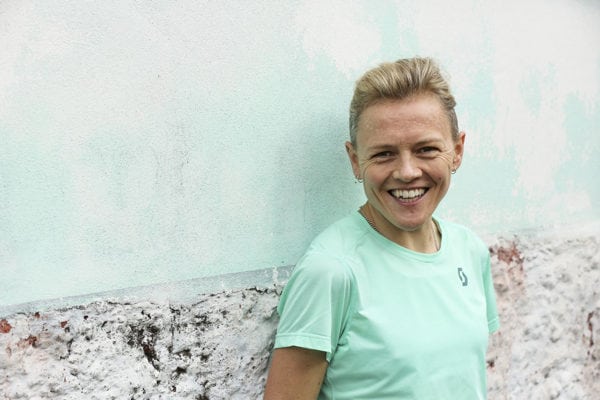
Jo Meek, aka “The Running Squirrel.” Credit: Scott Running/Ian Corless
iRunFar: I’m glad we’re having the chance to chat. How are you at the moment?
Jo Meek: I’m okay, apart from the fact that I’m ill. I’m quite grumpy. Yeah, I’m sick for 10 days now. I think I just ran myself down and so I’m paying for it now. I haven’t really been ill all season. I haven’t been running. I’ve been eating a lot and that’s about it [laughs].
iRunFar: Have you run since the IAU Trail World Championships?
Meek: I had two weeks off completely. Then I’ve just done a bit of running on the treadmill because the weather has been really random here and I don’t like to run in the dark. Then I’ve been ill. I’ve done some local cross-country races, like 6k races, and I think I’ve probably nailed too many too quickly or something, and I just haven’t recovered. Every weekend there’s one going on and they’re late nights and early starts. My body was kind of like, “Hey, what are you doing?” I think I should have taken the whole month off because now I’m having another two weeks off. It doesn’t really matter at this time of year. It’s just that I’m quite grumpy now because I want to go do a bit of sport.
iRunFar: You were the first finisher for Team Great Britain (GB) at the championships?
Meek: First, yeah. The team is full of really good fell runners and I thought, honestly, I live in a pretty flat part of the world and I didn’t want them to think that I was some sort of southern softie [laughs]. So I nailed it, it was really good.
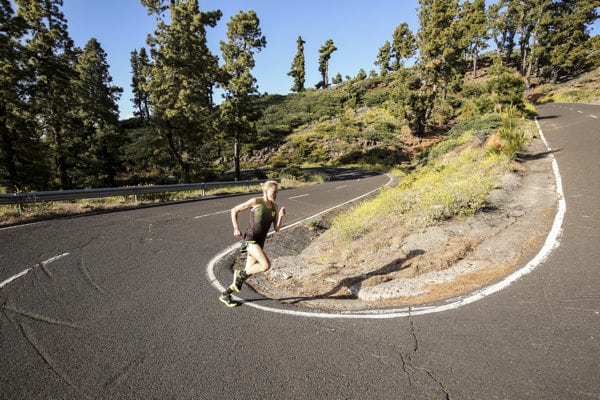
Jo has a long history of fast running on the roads. Credit: Scott Running/Ian Corless
iRunFar: That course was a bit technical, right?
Meek: I didn’t think it would be. [My husband] Jon and I went out to recce it and we had a complete nightmare. It was the day that [our dog] Rufus’s back legs weren’t working, and we were going to leave him with someone else. We rush him to the vet and then leave him to someone else and say, “Sorry, we’re having him put down on Monday, but could you look after him?” I felt awful. Jon and I were both crying, we felt awful. We got out to Portugal to do the recce—still thinking we were going to lose the dog—and got completely lost.
So when I was running the [Trail World Championships], what I discovered was that we got lost [during the recce] on recceing all the really technical stuff. We managed to recce the really sound road bits. Toward the end of the recce I realized that we might miss the plane so I had to cut off and through this area that had recently had a forest fire. I was absolutely covered in soot. It was a complete mess. Jon put me in the river before getting on the plane because there was nowhere to wash.
We got on the plane, got back—the dog was actually looking quite a bit perkier. We get back to the house and it smelt really funny. I realized I had left the gas on all weekend [laughs]. The whole weekend was a nightmare. Anyway, I’m in the race and it’s getting technical and I’m like, “Shit, this is really technical—I don’t remember this bit.” I was thinking, What a waste of time that recce was [laughs].

Rufus alive and well and still being a scruffy scoundrel. All photos courtesy of Jo Meek unless otherwise noted.
iRunFar: Is that a typical trip for you and Jon?
Meek: [laughs] Yeah. He was like, “I’ll run with you on the first day [of the recce].” We did 26 miles and I practically broke him because he wasn’t that fit then. He was really grumpy with me because we got so lost. The second day was better when I was on my own actually [laughs]. So, yeah, the course was quite technical but it was warm and nice weather.
iRunFar: Maybe it was good that you missed the technical sections during the recce because you had more confidence going into the race.
Meek: Yeah, but I was getting caught on all the technical descents. I just didn’t get frustrated. At Transvulcania, I got really frustrated [when I was being passed on the technical descents]. I lost my race because I was so angry. This time I just thought, It doesn’t matter if they catch me, because I was really strong and generally pretty fit so I knew I could catch people on the uphills. I’m not good on the technical downhills—I guess I don’t have the balls to do it.
iRunFar: Do you not have technical trails where you live?
Meek: No, no. The way I practice is that I go to where it’s really muddy and there’re maybe some tree roots, just to practice picking my feet up a bit, but there’s nothing else.
iRunFar: And where are you living these days in the U.K.?
Meek: In a county called Hampshire, which is quite near Southampton. It’s just south of London really—two hours south of London. We’re really close to the water and there is quite a good coastline but it’s about an hour and a half away. You know, that’s quite hilly. On weekends, I don’t know, once you’ve spent three hours in a car—I know people go out to the mountains and then drive back and I don’t know how they do it. We’re going to move next year—we’ll head down further south to a place called Dartmoor. The most you can climb there is about 1,000 meters, which is better than I’m doing at the moment. It’s just the way it is.
iRunFar: You’re a physiotherapist now. That’s full time?
Meek: Yeah, but it’s only part-time work. When you first start working you need to take any work you can get to become qualified. But part time makes it a bit easier.
iRunFar: Are you in the Hampshire region for your work then?
Meek: Yeah, so we used to live near Dartmoor and Jon couldn’t get work down there after graduating as a marine-biology student at the ripe old age of 40 [laughs], so I moved up here and got work. We live in a place where he commutes about 45 minutes for work and I commute about 45 minutes. We chose it because it’s quite close to an area that has a bunch of running routes—as opposed to living in a city or something.
iRunFar: Where else have you lived?
Meek: I lived in Australia for a year. I lived in London for three years. I’ve lived elsewhere and I was in the Army for four years, so I traveled quite a lot then. It’s nice to go back to what you know and to have a place to make roots. It’ll be nice to move back home [near Dartmoor].

Jo using up one of her many lives while sandpapering her face in a fall from the treadmill.
iRunFar: When did you get started in the Army?
Meek: I did one degree in sports science and realized it was a shit degree, so I must have been 21 or 23 [years old] maybe. Then I did four years in the Army, and then I came out of the Army and studied physical therapy.
iRunFar: What was it like to be in the Army?
Meek: I did a year training because I wanted to be an officer and actually that was alright because I was fit, so that made it a lot easier. Then the three years that I served, I traveled to different countries but the most significant one was Iraq. It was when the war there had just started. I did that for about four months—five months maybe. The other places I went were to Canada and going places for training exercises.
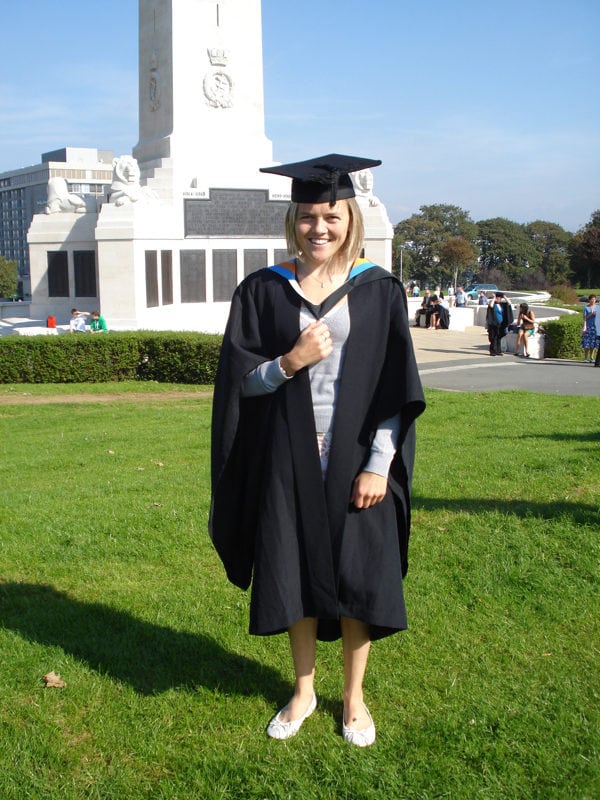
2008 physiotherapy graduation.
iRunFar: Were you involved in combat?
Meek: I wasn’t frontline—I say that but there isn’t really a frontline anymore. It’s not like we have trenches and that [laughs]. My job was logistics so everyday we did what we called a “milk run” and we delivered ammunition and fuel and stuff to the guys dotted around in the area we were working in, and then came back. Sometimes you would get shot at and some times you wouldn’t—it was a bit of a hit or miss, whether people were awake that early or not. Yeah, it was the same routine every day, day-in and day-out, delivering the same stuff. It was fine.
It was about six months after the war had started so things had been established. We were sleeping in tents with beds as opposed to the ground, I suppose. So the bases had been established. It wasn’t too bad. I came away with dysentery, though, which wasn’t great. That was awful [laughs]. I had done really well keeping on weight and stuff like that. It was really hot—I had drunk like 17 liters of water a day. It was so hot because you have body armor on and a helmet on. You just drink so much, you don’t really eat that much. Then I came up with dysentery. They had a hospital setup so I was there for a couple days. That coincided with my departure because I was leaving a week later. When I showed up back home Jon was waiting at the airport and said, “Oh my god, you look awful.” I had actually looked better [laughs].
iRunFar: Were you ever in a situation that was worrying?
Meek: I can really only remember one. There was this once when they barricaded the road. We thought, Is this a trap? Should we get out and move it or not? That was a bit of a decision but we did move it and it was fine. Someone made a pop at one of the vehicles but I don’t think—it was actually more of a scaring tactic.
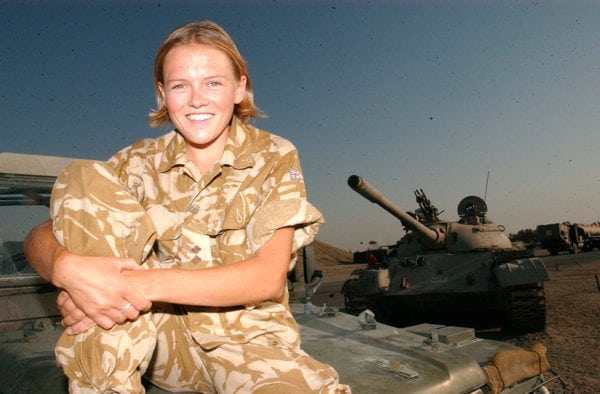
Jo while serving in Iraq for the British Army in 2003.
iRunFar: What was your motivation to join the Army?
Meek: It was like, Shit I need to get a job, and so I thought, What have I done? I had done sports science for three years and got that degree. Then I thought I could be a triathlete. I was actually pretty much full-time swim, biking, and running, but living at home with my mom, which wasn’t ideal. I was doing cleaning jobs and stuff to make ends meet. After a year I thought, If you haven’t made it now… It was interesting, at the end of one race a random bloke came up to me and said, “I think you should just run [laughs].” I took the hint that I’m obviously shit at swimming and cycling [laughs]. The only reason I kept doing it was because of the run at the end, which is probably fair enough. You know, I can swim but I didn’t learn as a kid that well and unless you have you’re sort of behind everyone else and I couldn’t carry the weight to be a good cyclist. I’m naturally not very powerful. I could be a good hill climber but the triathlon courses tend to be quite flat. After that I thought, I quite like sport, I’ll join the Army. It was really naïve. I didn’t really think it through—I just needed a job.
iRunFar: You must have been competitive in triathlon?
Meek: Yeah, I was competitive but I wasn’t knocking on the door for a Great Britain best or anything like that. I never did the Ironman distance—I wish I had. It was Olympic distance. It was fun. Once I joined the Army, I realized actually if you want to get any sport in, you can’t get all three in. So I carried my trainers around with me everywhere and just did running. I was a really keen runner before I joined and so I had a bit of fitness when I came in but you just can’t train as much.
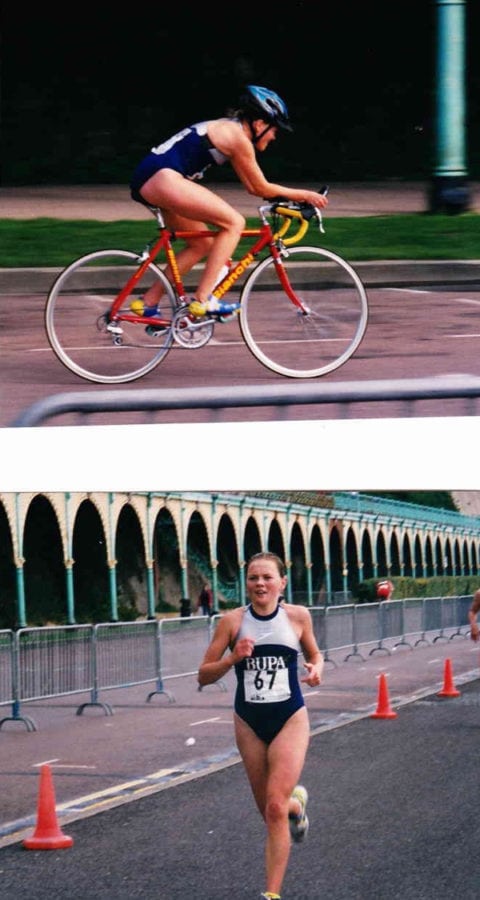
During her triathlon days.
iRunFar: In terms of difficulty or challenge, how does the Army compare with triathlon or ultrarunning? Is there one that sticks out as significantly more difficult?
Meek: No, not really. No, nothing. They’re all difficult in their own way. But you do them because you want to so are they really that difficult? I think there’s some stuff I did in the Army—so when I applied to be an officer, I didn’t get in straight away into the officer’s college. They wanted me to do this 12-week course just to see if I was the sort of candidate they wanted. The stuff we did on that course [laughs] was probably the toughest I’ve done. The running aspect of it was fine. It was more the other stuff that went with it. So, for example, you’ll be out on an exercise in the middle of winter, so for here that would be like six degrees [celsius] to minus four for like five days. They’d make you crawl up a riverbed on your belly. You’d be in wet clothes and you’d have to try to dry them on you, get into your sleeping bag at night, and try to dry them. I just can’t do that sort of thing. It was really cold all the time. It was physical but it wasn’t exhaustingly physical, it was just mentally quite challenging. You know, This is pretty shit and I could be in a nice warm house, but I’ll stick it out. So then when you come to do a race, you think, Well, I’ve done worse.
iRunFar: I think part of the satisfaction of finishing an ultra is that it’s difficult and you can do it. Would you agree?
Meek: Oh yeah, I love the physical challenge. In that basic element, they’re not actually that hard to do, I suppose. But that’s why we run fast: because then we can really, really test ourselves. We like to go to an event and give it absolutely everything. Because the thing is, running 100k is absolutely nothing compared to those people that do six days around a running path or something [laughs]. It’s whatever takes your fancy. I like to keep the distance quite succinct, it’s quite identifiable, and you can nail it.
iRunFar: Do you find it more of a mental or physical challenge with ultrarunning?
Meek: [pause] I suppose… physical? I don’t know. Yeah, I don’t know. I’m never going to give up unless I’m seriously injured. So I guess it’s physical because in theory you’re pushing as hard as you can go. I would hate to finish a race and say, “What if I could have gone harder?” That would just be the worst question, wouldn’t it? So, yeah, I guess it has to be physical—you have to push. [Mental and physical are] really closely interlinked though.
iRunFar: Do you think your experience in the Army has helped you with ultrarunning, in a mental sense?
Meek: But I think I had it before I joined because I probably would have dropped out. I think it’s naturally something you’ve got, you know? I’ve always gone for doing long stuff knowing that I can’t do short events, so I think that goes then with having a sort of mental disposition.
iRunFar: Did you realize you had this sort of disposition long before you joined the Army?
Meek: No. Well, I mean I used to race sailing boats. They were the little dinghies, you know, when I was a kid in the summer and stuff. Even if it was wet, cold, and blowing, and I couldn’t keep the boat up, I still wouldn’t not get in. I actually think I’m quite stubborn. I wouldn’t say I’m naturally—I’m just stubborn [laughs].
iRunFar: That sounds like Sarah Bard and her drive to not stop when she’s walking with heavy grocery bags.
Meek: [laughs] Yeah that reminds me of a story because when I was dating Jon he lived up in a place in Dartmoor, and it was the highest place in Dartmoor, and it was maybe eight miles from where I lived—not that far, eight to 10 miles, but it was all uphill. I forget how much gain it would be but maybe 400 or 500 meters, I don’t know. His car was flat and so he wanted a car battery. So I went to buy him one and I put it in my rucksack and cycled up with it on my back [laughs]. Just because I thought, Well, that would be a good time. I could have driven it up [laughs]. So I think we all kind of do stupid things. I get up there and he was like, “What the hell are you doing?” And my shoulders were really sore and my back was raw from where it had rubbed [laughs]. So I guess, yeah, we do stupid things like that. I said it was for my devotion and my love for him [laughs].
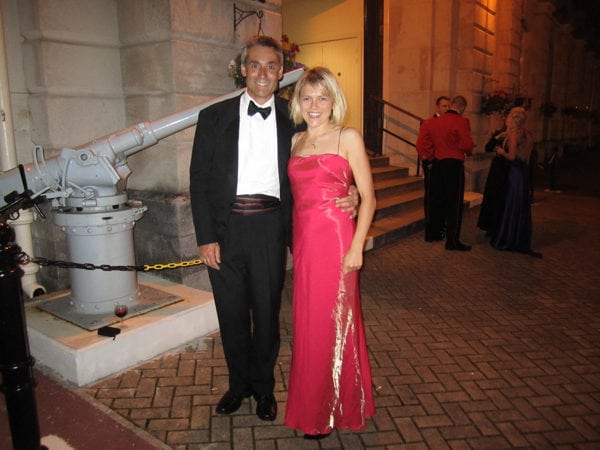
Jo and Jon not running, for once.
iRunFar: Do you think the disposition to endure has developed over the course of your career—from being in the Army, to triathlon, to marathoning, to ultramarathoning?
Meek: I suppose so because if I think about the MdS in the first couple of days, I was quite respectful of it. Maybe I left a little bit in the tank, whereas now I don’t think I would. I still respect the distance but I also know I can do it. I suppose I have learned as I’ve gone along. Also you learn how much fuel to use, so learning the practicalities means that you can really push it because you know the signs of feeling lightheaded and the low-blood-sugar thing.
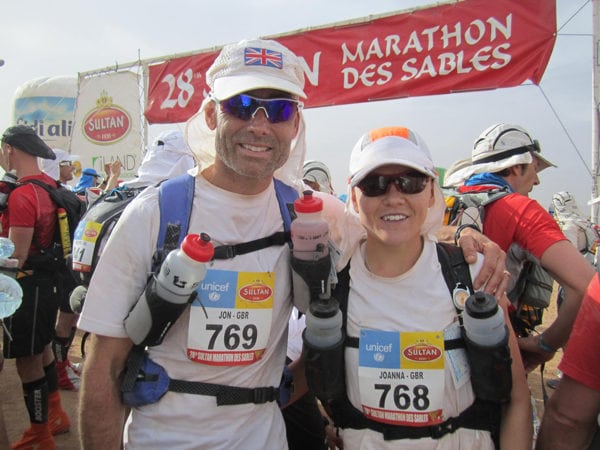
At the 2013 Marathon des Sables with Jon.
iRunFar: You ran more mountainous races this year. Did you do any mountain running when you were younger?
Meek: No, no. I was basically a fat kid that didn’t like sport. At school I never got selected for any team sports so as a result they used to have the fat kids and unwanted go for a run [laughs]. So I just had to do that. Then one day I thought, I want to lose weight so I’m actually going to do a bit more running.
So my mum used to do a little bit of running. And when I say a little bit, I mean a little bit. There’s this thing called the Hash House Harriers. It’s a worldwide thing and I think it started in the hash houses of Hong Kong or something like that. It was a way for expats to get fit, or something like that. [Author’s Note: Meek seems to be correct about these origins.] It’s quite big. Someone lays a route and every week it’s a different person who lays the route. They all meet up, follow the route, then go to the pub afterward. My mum used to do a little bit of that. One day she went out for a run and I sort of followed her, and I thought, Well, I can do this. I did it for the sole purpose of trying to lose the weight. I never started on a running track, I just started on the roads. Eventually I joined a running club at 16, 18 [years old] and, yeah, it went from there really. I didn’t really run as a kid at all.
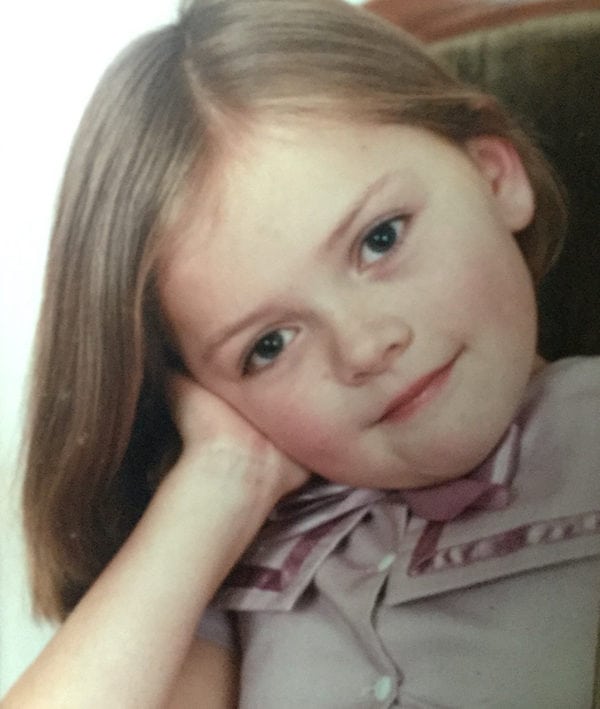
A young Jo.
iRunFar: Did you find that you were good when you joined the running club?
Meek: I could run for a long time. I was never really good but I could keep going. Someone told me I should do a bit of speedwork. I mixed it up a bit. I think if you stick at something long enough, you get good at it [laughs].
iRunFar: How long was it before you felt that you were good?
Meek: I don’t know. When I went to university at 18, I suppose it was around then—so I must have been running [for the club] at 16. My mum said I just loved chocolate and sweets [laughs] and she couldn’t get me away from them. I can vividly remember giving up chocolate. I said, “I’m going to give it up—sweets and chocolate—and start running and lose some weight.” To be honest, I haven’t really gone back on to chocolate. That was it. Every so often I’ll have a taste for it, but yeah. That was that really. I went to university and I did a lot of running. I did my first marathon, the London Marathon, in three hours or something—it wasn’t too bad. But I also really enjoyed going out drinking and doing stuff you shouldn’t do as a runner, so I didn’t take it that seriously.
iRunFar: Wait, we aren’t supposed to be drinking?
Meek: [laughs] Probably more the recreational substances we’re not supposed to be doing [laughs]. But you have to try something once, haven’t you [laughs]? Then after I left university I got a bit into triathlon and that’s when I thought I should do triathlon for a bit.
I then took marathon running really seriously—road-marathon running. In hindsight, I was also doing too much else—I was doing the Army and working in a running-shoe shop and commuting and we had just got a dog—and I was always too tired and training too hard—in hindsight. At the time I had done 2:46 and someone said—I was due to race in London at some sort of trial at the London Marathon, and I was aiming for sub-2:40, and I was having this problem where I was getting a pain under my rib cage. It comes on only when I run at threshold. So I thought I would try to see another physio to have a look at it. I went to see a physio and he pressed so hard—thinking that it was up and under my ribs—that I was in absolute agony. It was making me cry during the treatment. When I got back that night I heard a crack. I had basically cracked my rib and couldn’t run the marathon. I was really devastated after that. I sort of lost momentum, really. I kept hanging onto the same time, 2:46. I could probably run it week-in and week-out but I couldn’t get any quicker. What I realize now is that I needed a lot more rest.
During the Army I did quite well—I met Prince Philip, obviously the Queen’s husband, and got “Combined Sportsperson of the Year.” That was good. But the Army—it was quite small. I was a big fish in a small pond, I suppose. But I did quite well running in the Army. Then when I came out, I thought I would give marathoning a go but I never quite made it. I only did two or three a year but I was training so hard, it was relentless. You would come in so disappointed because you couldn’t keep holding your split times, you know, whereas now it’s like, “Well, it doesn’t matter, it was a bit muddy out there [laughs].” The pressure is almost off, you know? My biggest regret is not running six-minute pace for a marathon—I wish I could say that I could do that. I can’t go back to the running track now—I hate the running track.
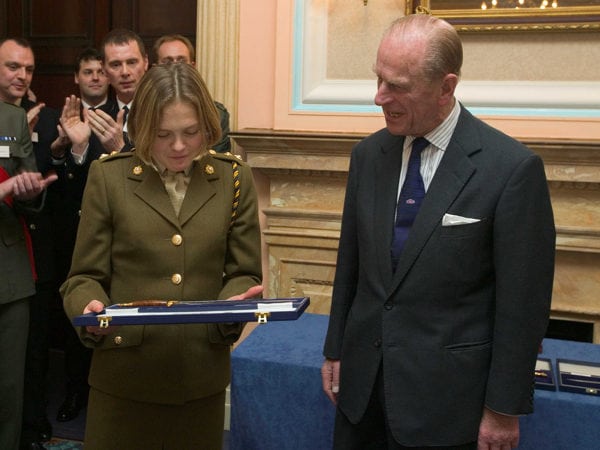
Prince Philip honoring Jo as the 2004 Combined (Army/Royal Navy/RAF) Sportperson of the Year.
iRunFar: What was the impetus to run ultras?
Meek: For years I thought, I’m never going to run an ultra because it will take away my marathon speed. And then all of a sudden I was like, Actually, time’s moving on. And I really wanted to do the MdS. I said to Jon, “I’m thinking about this.” And he said, “Yeah, let’s do it.” That was it. I never looked back because I came second in that and thought, Well, I guess I’ll just go with it. That was in 2013.
iRunFar: This sounds a lot like Ian Sharman. He first ran the London Marathon and then eventually the MdS after he learned about it on TV.
Meek: Yeah, in the U.K. everyone has heard of the MdS so we had loads of support and we were doing it together so training was really easy in terms of—we went out the door at the same time and it was brilliant. From that, we both thought it was really good—it was a whole new world, and just the freedom of it. Then I heard of the Comrades Marathon, so I entered that. I think Mike Wardian actually told me about it.
After the MdS I was invited to run The Coastal Challenge in Costa Rica. Then from there I met people like Wardian and Nick Clark and they said, “There’s this race and that race.” So I went home and promptly entered a million races, over raced, and then had to take the [first six months of 2015] off. I did 13 ultras in 12 months [in 2014]. I really just did too much.
iRunFar: You hate not running. How did you manage when you couldn’t run for six months?
Meek: Oh no, that was really awful, awful. Honestly, you like to think you’re a rational person, but six months of not running was just awful. I’d like to think now I could cope better but I don’t think I could. It was just so difficult. I was just so low. I tried cycling but then my injury wouldn’t let me do that. Basically my knee really hurt. I realize now what was wrong but at the time I went to see loads of people. It’s really random—I’ve never seen it in a patient—but basically the kneecap got stuck down and so nothing would slide when I ran. Basically when the knee joint’s involved it’s a good six months of just letting that settle. I didn’t fully realize that. There was nothing structurally wrong. It was just too much. You asked about the hardest thing I’ve done and being injured is the hardest thing. It’s alright having two weeks off when you’re ill and you don’t feel that great but you know you can run. It’s knowing you can’t run that’s the killer. Obviously Jon was going out running as well—I’d be like, biting off the bannister.

Banged up after a bike crash during the first date with her now-husband Jon.
iRunFar: What do you think you’ll do 40 years from now if you aren’t running?
Meek: Well, then it’s your choice to stop, isn’t it? I think it was not having the control because, you know, we’d go walking in the mountains and stuff together, but it was the fact that it’s not my choice to be injured. I realize you can’t control stuff, and it makes you completely irrational. I realize that there’s more to life than running but it was really, really hard.
And I can imagine now—you know, Ellie Greenwood has been injured. I just feel so bad for her because she bounces from one injury to another and yet she works around running and it must be the worst—and she hasn’t even got a prognosis or a diagnosis. I was in the same place she was in and it was bad.
So my first race back [in 2015 after the injury] Jon and I made it a big one. We had a camper van, which we sold and we used the money to go to the Everest Trail Race. That was good. We did that and then after that I did The North Face [Endurance Challenge 50 Mile Championships]—it wasn’t great but I really enjoyed it. So I want to go back there and try to nail that. Then this year I’ve done five ultras and it’s worked out fine.
iRunFar: You don’t see yourself running forever?
Meek: Well, everyone needs something, don’t they? We made the decision not to have kids, so we’ve got to have something. We’ll probably do quite a lot of traveling. We might do a little bit of touring on bicycles or something a bit more leisurely.
iRunFar: It’s movement, I guess, broadly speaking, that you need in your life.
Meek: Yeah, to be physically fulfilled and doing something active—something like that. You know, I go to the gym twice a week and I quite like that and that in itself in an average week might be fine. We’ll see what happens. At the moment I’ll try to stick to the running as long as I can.

Jo running on La Palma in the Canary Islands in 2016. Photo: Scott Running/Ian Corless
